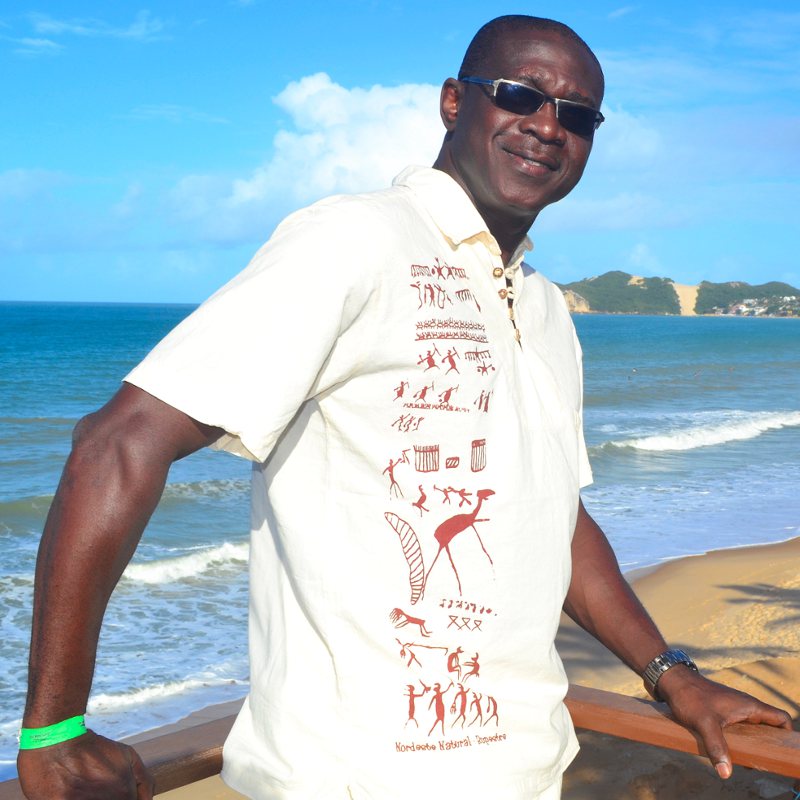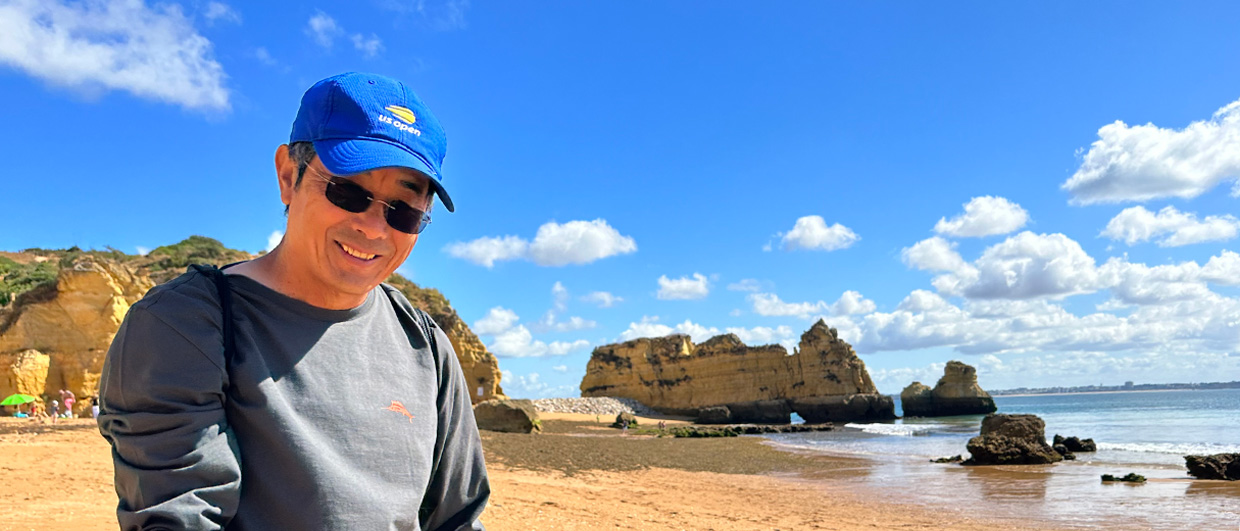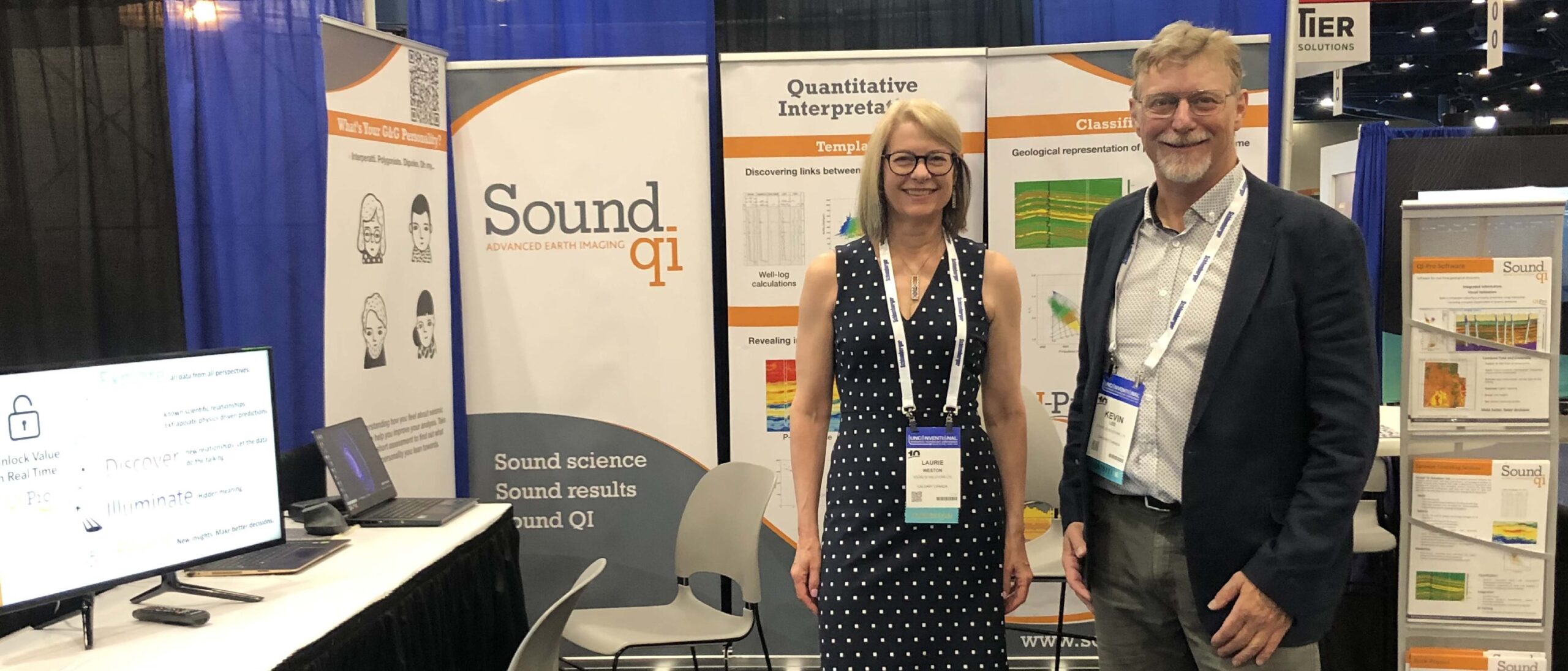Even in the international oil industry, the career of Benjamin Kwame Asante, Lead Geophysicist at the Ghana National Petroleum Corporation (GNPC), is remarkable. It’s a story of life-long learning and personal determination, combined with the luck of being in the right place at the right time. As Ghana’s oil industry has taken off, Ben has found himself at the forefront, gaining rapid first-hand experience of the technicalities of oil exploration and production, and moving fast into management and an advisory role to government. For most people that would be career enough, but now a student again at GIMPA Law School, Ben has a whole new career in mind.
Hydrology, Not Seismology
Ben’s early interest in Earth Sciences came from observing the daily trips to the village well.
“Fetching water was every child’s job from the age of six or seven,” he explains, “and we carried it on our heads. But in the dry season the water was so dirty we had to leave it for a day to settle before it could be boiled. For anyone living on the coast, there was the added problem of salt contamination due to seawater encroachment.”
 Ben enjoys travelling, as can be seen from this photo of him in Brazil.This early experience led to an interest in hydrology and in 1984, Ben was admitted to the University of Science and Technology to study Geological Engineering. The journey from village to university was itself atypical since school was not compulsory at the time. Fortunately Ben’s parents believed in education and he was lucky enough to benefit from the fact that certain prestigious mission schools were still in existence. Following primary and middle school at the Begoro Presby primary and middle schools, Ben took his common entrance exam early and was admitted to St Peter’s, a Catholic Secondary school at Nkwatia-Kwahu, about 150 km north of Accra. The school was run by a German Roman Catholic priest with Ghanaian and other ex-pat teachers and was a great opportunity for a young lad – but a long two-hour bus-ride from his home and family in the east.
Ben enjoys travelling, as can be seen from this photo of him in Brazil.This early experience led to an interest in hydrology and in 1984, Ben was admitted to the University of Science and Technology to study Geological Engineering. The journey from village to university was itself atypical since school was not compulsory at the time. Fortunately Ben’s parents believed in education and he was lucky enough to benefit from the fact that certain prestigious mission schools were still in existence. Following primary and middle school at the Begoro Presby primary and middle schools, Ben took his common entrance exam early and was admitted to St Peter’s, a Catholic Secondary school at Nkwatia-Kwahu, about 150 km north of Accra. The school was run by a German Roman Catholic priest with Ghanaian and other ex-pat teachers and was a great opportunity for a young lad – but a long two-hour bus-ride from his home and family in the east.
“Being so far from home at such a young age was hard, but I really appreciated the opportunity I had been given,” says Ben. “At home we spoke the local languages of either Twi or Akan, but English was the official means of instruction in all schools in Ghana and I learnt very quickly.” By the time Ben was admitted to university, Ghana had already discovered commercially exploitable oil reserves at the Saltpond Basin. As his programme of study at the university opened up in its second and third years, Ben found himself abandoning hydrology and increasingly drawn towards the mineral exploration and geophysics options. “Even though Ghana has many minerals, I wasn’t interested in the hard rocks,” he says. “I decided I wanted to be part of something up and coming.”
An Industry with a ‘Buzz’
However, on graduating in 1988, Ben was obliged, as were all Ghanaian students, to do a year of national service in order to repay the costs of tuition. He found himself posted to the Geological Survey Department in Accra. Frustrated with the lack of ‘action’, after three months he managed, through a network of personal contacts, to get himself seconded to GNPC, the four-year-old national oil company. Along with two fellow mates he became one of the ‘service personnel’, working in the field on a very small allowance, with little control over his career.
With a staff of less than twenty involved in exploration, there was ‘quite a buzz’ and Ben was quickly given responsibility for surveying two areas. Within a year he had approval to do wellsite duty on drilling rigs. Periods on board a seismic vessel were interlaced with training sessions.
“It was great to be employed by the national oil company, working from an office in Accra,” he says. “I was involved in everything – not just the quality control on the seismic vessel during acquisition, but on guide vessels and on land as community liaison at certain times. I was, and have continued to be, involved in a range of activities: seismic data interpretation, negotiations, policy formulation, promotion of the hydrocarbon potential of Ghana, management roles and mentoring of junior colleagues.”
Promoting Ghana’s Potential
In 1991 Ben travelled abroad for the first time – a personal trip to the UK – and two years later he was awarded a Norwegian government scholarship (NORAD), to the University of Trondheim in Norway, to do a post-graduate diploma in Petroleum Exploration and Production.
“By then I was used to being the only black person on a seismic vessel. In Norway I was mixing with students from Nigeria, Kenya, Uganda, Tanzania, Madagascar and Bangladesh, as well as the locals,” says Ben. “Part of the industry is about learning to adapt, to accept cultures and the different way people do things. I only remember one incident of discrimination, out at some country bar. Generally we were well looked after and given a very good reception.”
The year in Norway not only introduced Ben to snowball fights and skiing but the course covered all aspects of exploration, environmental issues and policy making. At the end of 1993 he returned to Ghana and married his long-standing partner, Grace, who has her own career in shipping and freight management. Ben has two children – a girl and a boy.
At GNPC, Ben’s career moved fast. He was soon promoted from Assistant Geophysicist to Geophysicist Officer, a role that broadened his experience of giving presentations, management and training. In 1998 he was promoted again to the role of Senior Geophysicist and later to Lead Geophysicist.
His promotions involved an increasingly active role in the promotion of Ghana’s hydrocarbon potential to foreign investors, as well as the drafting and review of the state’s petroleum laws. “It was so fascinating, giving presentations at local and international conferences and also meeting other professionals and parliamentarians to review and formulate policies for the petroleum industry in Ghana, and defending petroleum agreements.”
As Senior and later Lead Geophysicist, Ben was working closely with foreign companies – Kosmos and Tullow, Hunt, Nuevo, Devon and Dana Petroleum and many more – who, in the ‘90s and early 2000s, were actively exploring the offshore sedimentary basins in Ghana. At this stage they were mostly limited to not very deep waters. However, Dana’s commitment to Ghana was sufficient for them to offer Ben a three-month attachment to their office in Aberdeen in 2001, a great learning experience that encouraged him to think about further studies. However, in 2003 Dana folded as a company – truly unfortunate timing since oil was discovered in the Jubilee field not long after. “They sent us a congratulatory email when the news came out,” says Ben, “but clearly it was a painful experience for them.”
First Oil
Kosmos’s discovery of the Jubilee field in 2007 finally confirmed Ghana as a source of commercially recoverable oil (although Ghana was already producing some 400 bopd from the Saltpond field). Because of the dynamic communication with wells in the next block where Tullow had exploration rights, unitisation was necessary. It took two years for a plan of development to be agreed and during this period Ben acted as coordinator with the Ministry of Energy and parliament. He had an office at the Presidency as a member of the Oil and Gas Technical Committee set up by the President. First oil was achieved in December 2010.
Soon after, Ben was part of the team hosting Ghana’s first international oil and gas conference after the Jubilee discovery, with attendees from the UN, the World Bank, Norway, Trinidad & Tobago and the West African sub region. He was subsequently invited back to Norway to study the management of their oil industry and its revenues. Returning home, he became part of the team that travelled around Ghana having regional consultations with the public as to how they wanted the oil revenues to be used and the priority areas into which the oil monies should be channelled. This public consultation led to the formulation of the Petroleum Revenue Management Act for Ghana and a review of Ghana’s oil and gas laws, tackling difficult subjects such as ‘local content’ employment policies.
“I’m really proud to have been part of it,” says Ben. “Travelling around the country and talking with ordinary people about their priorities and expectations led to the establishment of a heritage fund and a stabilisation fund, both of which should help Ghana avoid the ‘resource curse’. We need an equitable distribution of revenues. It’s been positive so far, although we’re seeing too much fire-fighting at the moment. Ghana needs to stick to the national development plan that came out of the stakeholder consultations.
“Local content is a difficult issue for a country like Ghana,” says Ben. “Expectations have been high and we have had to manage the people’s expectations. We have really had to stress that the industry will not bring a great increase in employment and people should help develop other sectors of the Ghanaian economy so as to avoid the ‘Dutch Disease’. All oil-related contracts are published so it’s a fairly transparent process. If a Ghanaian company is within ten per cent of the optimum bid, we still consider them – this was stipulated in the Petroleum (Local Content and Local Participation) Regulations. The purpose of the local content and participation regulations, known as L. I. 2204, is to promote the maximisation of value-addition and job creation through the use of local expertise, goods and services. The inclusion of local businesses and financing in the petroleum industry value chain and the retention of capital and expertise in Ghana are essential for the country’s development. The position at the moment is that companies such as Schlumberger, Baker Hughes, Halliburton etc. are almost the only companies that can provide services on the rigs – the same is true for seismic companies. But we want Ghanaian companies to develop and build capacity so that they are providing some of the essential complex services as well as those already mastered – the fabrication work, pipes and steel works, recruitment, maintenance of the FPSO and general servicing. This would bring more employment. Ghanaians are certainly learning fast.”
For some, helping to lay the foundations of Ghana’s oil industry might have been career enough but in 2012, Ben decided to go back to the University of Aberdeen to do a Master’s degree in hydrocarbon exploration (exploHub). “We were a cohort of just five students and the second batch to go through this new course at the University of Aberdeen,” says Ben. “It was intensely practical – much field work, and lectures from industry leaders. It was a really worthwhile year and it has enabled me to do much more mentoring of colleagues back in Ghana.”
A New Career
 Ben graduated in 2013 with a M.Sc. in hydrocarbon exploration from the University of Aberdeen.Ghana is now pumping 100,000 bpd and is aiming for 250,000 by the end of the decade. Ben’s career, like Ghana’s development, is full of significant milestones – but they are not over yet. Rather than coasting towards retirement as the Lead Geophysicist and a key policy adviser to government and probably a consultant to the GNPC or the Petroleum Commission, Ben is now embarking on a whole new career – this time, in law. He has been admitted to the Bachelor of Laws (LL.B) programme at the faculty of law at GIMPA, Ghana, and started his three years of study in September this year. Although he is interested in general law, he expects he will specialise in petroleum and corporate law.
Ben graduated in 2013 with a M.Sc. in hydrocarbon exploration from the University of Aberdeen.Ghana is now pumping 100,000 bpd and is aiming for 250,000 by the end of the decade. Ben’s career, like Ghana’s development, is full of significant milestones – but they are not over yet. Rather than coasting towards retirement as the Lead Geophysicist and a key policy adviser to government and probably a consultant to the GNPC or the Petroleum Commission, Ben is now embarking on a whole new career – this time, in law. He has been admitted to the Bachelor of Laws (LL.B) programme at the faculty of law at GIMPA, Ghana, and started his three years of study in September this year. Although he is interested in general law, he expects he will specialise in petroleum and corporate law.
“I never thought I would be going through entrance exams and interviews at this stage of my career, but I just fancy the profession – and it’s one way to make sure I am still needed when I reach retirement age!” he says.
With such a rare skill-set, it seems unlikely that Ben Asante would ever have found himself unemployed. It will be interesting to see where this next step in education takes him – possibly closer to a direct role in politics? Given such a remarkable career, it seems the options are fairly limitless.






